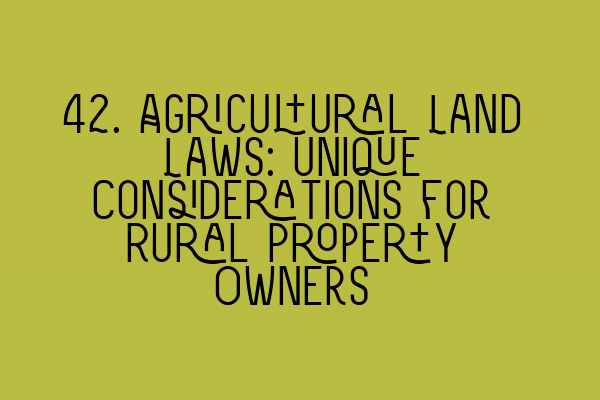42. Agricultural Land Laws: Unique Considerations for Rural Property Owners
Welcome to another insightful blog post from SQE Property Law & Land Law. In today’s article, we will be delving into the world of agricultural land laws and discussing the unique considerations that rural property owners need to be aware of. Whether you are a farmer, landowner, or investor interested in agricultural property, understanding the legal framework surrounding this specific type of land is crucial.
The Importance of Agricultural Land Laws
Agricultural land laws play a vital role in regulating rural properties and ensuring the sustainable use of agricultural resources. These laws are designed to protect the interests of both landowners and the wider community, facilitating responsible farming practices and safeguarding the countryside.
By familiarising yourself with the key aspects of agricultural land laws, you can ensure compliance with regulations, protect your investment, and avoid potential legal issues down the line.
The Legal Framework for Agricultural Land Ownership
At the heart of agricultural land laws in the UK is the concept of farm tenancy. A farm tenancy is a legal agreement between a landowner (known as the landlord) and a tenant farmer (known as the tenant). This agreement allows the tenant to occupy and use the land for agricultural purposes.
There are various types of farm tenancies, each with its own unique characteristics. The most common forms include Agricultural Holdings Act (AHA) tenancies, Farm Business Tenancies (FBTs), and Grazing Licences. It is essential to understand the type of tenancy you have or wish to enter into, as it will dictate your rights and responsibilities as a landowner or tenant.
In addition to tenancy agreements, other legal considerations in agricultural land ownership include:
- Planning permission for agricultural buildings and changes in land use
- Environmental regulations and conservation issues
- The impact of the Common Agricultural Policy (CAP) and Brexit on farming subsidies
- Boundaries and rights of way
Tenant Rights and Restrictions
As a tenant farmer, it is crucial to understand your rights and restrictions under the terms of your tenancy agreement. These may include:
- The right to carry out agricultural activities on the land
- Restrictions on subletting or transferring the tenancy
- The requirement to maintain and repair the property
- Guidelines for managing livestock and crops
- The length of the tenancy and conditions for termination or renewal
By having a clear understanding of your rights and obligations, you can ensure compliance with the terms of your tenancy agreement and avoid potential disputes with the landlord.
Landlord Rights and Responsibilities
As a landlord of agricultural land, you have certain rights and responsibilities that you need to be aware of. These may include:
- The right to receive rent from the tenant
- The responsibility to provide suitable access to the land
- The obligation to maintain the agricultural buildings and infrastructure
- The ability to terminate the tenancy under specific circumstances
- The requirement to comply with health and safety regulations on the land
Understanding your rights as a landlord will empower you to manage and protect your agricultural property effectively.
Consulting a Solicitor for Agricultural Land Matters
Given the complex nature of agricultural land laws, seeking professional legal advice from a solicitor with expertise in rural property matters is highly recommended.
An experienced solicitor can provide tailored advice and guidance, helping you navigate the intricacies of agricultural land laws, drafting and reviewing tenancy agreements, assisting with planning applications, and representing your interests in case of disputes.
At SQE Property Law & Land Law, our team of expert solicitors is well-versed in agricultural land laws and committed to providing high-quality legal services to rural property owners. We have extensive experience in advising clients on a wide range of agricultural land matters, including farm tenancies, planning permissions, and environmental regulations.
To learn more about how we can assist you, please contact us to schedule a consultation with one of our knowledgeable solicitors.
Conclusion
Agricultural land laws can be complex, and it is crucial for rural property owners to understand the unique considerations that apply to their land. By staying informed about the legal framework for agricultural land ownership, tenant rights and restrictions, landlord responsibilities, and consulting a solicitor with expertise in this area, you can navigate the legal landscape with confidence.
If you have any further questions or require assistance with agricultural land matters, the team at SQE Property Law & Land Law is here to help. Contact us today to arrange a consultation.
